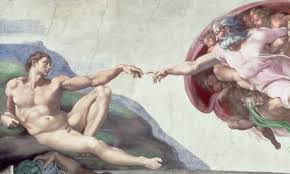
Can We Live in God’s Presence?
Many people are uncomfortable, even embarrassed, by personal expressions of religious belief or practice. So be warned, I’m about to engage in such an expression.
About a year ago, I started the practice of “placing myself in God’s presence” before my normal morning prayers. I sit comfortably in a quiet place, sometimes in the early-morning semi-darkness, and pray something like this:
“Father, I know you are here with me, in me and around me and in and around the billions of other people on earth, believers and non-believers. And that you stretch from here to beyond the ends of the universe. Help me to believe, and recall your presence throughout the day.”
Some May Not Be Ready
I realize some people searching for God may not be ready for this kind of prayer. After all, it assumes that to some extent, you’ve already found God. But as I’ve mentioned before, I believe you acquire faith at least partly by “doing” it. At some point, you just have to jump in. It doesn’t mean you still won’t have doubts because in my view, faith means accepting uncertainty. And this, in my opinion, doesn’t contradict the idea that faith is a gift from God.
Isn’t awareness of God’s presence in the world one of the goals of skeptics searching for God? If we’re not aware of God’s presence, what difference does it make whether or not we believe in him/her? And we don’t “acquire” faith just by reading books or hearing rational arguments. It requires practice.
In “Living in the Presence of God,” John Hardon, S.J., writes about what the presence of God could mean.
“A person may be physically present in a room, but unless we are somehow aware of that person being there, and respond to that presence, he or she might just as well not be there.”
So awareness is what we’re talking about here, awareness of someone who isn’t physical, “the reality which is independent of space and time,” as Hardon puts it. And as we become aware, God becomes present to us.
“If, then, we wish to cultivate living in the presence of God, we must set our minds to think about God,” he writes. “We must place Him before the eyes of our mind.” And this God will not force him/herself on us. “We must look at Him with the power of our mental reflection enlightened by faith.”
Still, it’s often hard for me to focus on this presence. I’m often still sleepy in the morning. There are distractions, mostly from inside my head. That’s why it’s important to choose a time when and where distractions are minimal – such as in early morning and a place where you can be by yourself.
It’s also important that my prayer doesn’t become an empty ritual, something I do simply out of habit. That’s why I change the wording often and sometimes don’t use words at all, but simply try to feel God’s presence and bask in it.
And you can’t be discouraged when you get distracted, forget what you’re about or have doubts, feeling that it’s a waste of time, that God doesn’t care about what you have to say or even that there’s no God to hear your prayer.
That brings me back to the subject of doubt and what theologian and philosopher Tomas Halik, whom I often quote in this blog, has written about his own doubts and the realization that followed.
Inexhaustible and Bottomless
“True religious faith on earth can never end like a successful search for some object or other – i.e., by finding and possessing – because it is not directed toward some material end, but to the heart of mystery, which is inexhaustible and bottomless.
“The path of … people often on the fringe or beyond the visible frontiers of the churches, in the zone of questions and doubts, in that singular region between the two fortified camps of those ‘whose minds are made up’ (i.e. self-assured believers and self-assured atheists) helped me get a fresh understanding of faith and of the One to whom faith relates.”
Though we place ourselves in God’s presence, we can’t “possess” God. But we can arrive at a realization of God’s presence to a point where Psalm 138 (in Catholic Bibles) moves us.
“O where can I go from your spirit, or where can I flee from your face?
If I climb the heavens, you are there. If I lie in the grave, you are there.
“If I take the wings of the dawn and dwell at the sea’s furthest end,
Even there your hand would lead me, your right hand would hold me fast.”



